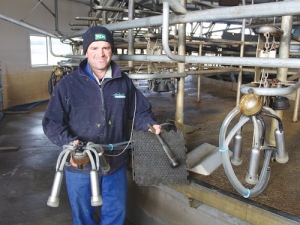Recycled milk liners prevent waste
The Walshe family, of Putaruru, are contract milkers, sending 470 cows through a 40 bail herringbone shed. They're finding success with Quthane milking liners from DairyFlo.
 Wairarapa farmer Phillip Engel says rinsing cups and plastic liners have helped keep mastitis at bay.
Wairarapa farmer Phillip Engel says rinsing cups and plastic liners have helped keep mastitis at bay.
A Wairarapa dairy farmer has virtually eliminated clinical mastitis in his herd by rinsing cups between cuppings and turning to plastic liners.
Phillip Engel milks 400 cows through a 50-bail rotary shed on his family farm south of Carterton.
Engel says he has lowered his herd's somatic cell count scores from the previous season and slashed the number of cows in the farm's hospital mob from 12 to one or two.
The breakthrough came after testing revealed that all the clinical cases on his farm had been caused by mastitis in and around the teat area.
"We ran dozen of tests on clinical cases in the herd and in every case the reason for the mastitis infection was a teat infection caused by cow effluent getting into the teat canal."
While Engel and staff had always kept a clean shed he says they lifted their game further by beginning a strict regime of rinsing each cup with fresh water before each cow.
While milkings now take longer, Engel says improved milk quality and fewer cases of clinical mastitis more than make up for it.
"It adds 15-20 minutes to milking but you don't have the issues of the drug mob coming after us."
While rinsing cups before applying isn't new, Engel believes it's important to get back to basics. "I believe the New Zealand dairy sector has lost a lot of skills."
DairyFlo milk liners are now used on the milking platform. Made from a soft, smooth plastic, the liners are non-porous, reducing the risk of contaminants getting into the milk and lasting longer. Inflations withstand at least 5000 milkings before needing replacement, which Engel says is already paying off.
"They've already completed well over 2500 milkings and still have a good level of elasticity."
Engel noticed that some milk was always left over in cups after washing due to their design. While the plastic liners were an improvement, this problem still existed.
"There was always residue left on the cups which could result in cows with mastitis infecting other animals in the herd," he says. "One cow can infect eight other animals."
Engel suggested a concave design to help drain water freely. Rubber liner manufacturers weren't open to adjusting their moulds, but DairyFlo was.
He installed two of the new cups recently and says results were impressive: the cups show residue milk was reduced.
Milking with the new cups takes a little getting used to: the somewhat rigid nature of the cups makes it important for operators to change the way they hold the cluster when cupping up.
"The big difference is during washdown, as jetters need to align with the inflations correctly to create a vacuum."
Ultimately Engel says the new inflations and milking method have allowed him to adjust the way the business runs, also using the DairyFlo milk and air tubing which will eliminate rubber from the platform to the cow.
"This product will outlast rubber and maintain a bug free environment inside and out."
The other bonus feature: "This product is totally recyclable; liners and tubing can be made into anti-fatigue matting," explains Engel.
"The numbers thing dawned on me," he said. "I believe I can do a whole lot better with a lot less waste."
Herd improvement company LIC has posted a 5.2% lift in half-year revenue, thanks to increasing demand for genetics.
According to the latest Fresh Produce Trend Report from United Fresh, 2026 will be a year where fruit and vegetables are shaped by cost pressures, rapid digital adoption, and a renewed focus on wellbeing at home.
The Roar is a highlight of the game hunting calendar in New Zealand, with thousands of hunters set to head for the hills to hunt male stags during March and April.
OPINION: The past few weeks have been tough on farms across the North Island: floods and storms have caused damage and disruption to families and businesses.
European dairy giant Arla Foods celebrated its 25th anniversary as a cross-border, farmer-owned co-operative with a solid half-year result.
The sale of Fonterra’s global consumer and related businesses is expected to be completed within two months.
OPINION: Fonterra may be on the verge of selling its consumer business in New Zealand, but the co-operative is not…
OPINION: What does the birth rate in China have to do with stock trading? Just ask a2 Milk Company.